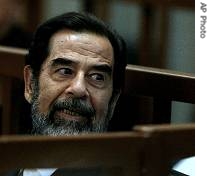2006年VOA标准英语-Kurds Watch as Saddam Hussein Genocide Trial Be
搜索关注在线英语听力室公众号:tingroom,领取免费英语资料大礼包。
(单词翻译)
By Brian Padden
Irbil, Iraq
21 August 2006
Saddam Hussein's second trial on charges of genocide is being watched closely in the northern Kurdish region, where Saddam's forces accused of killing1 more than 180,000 Kurds nearly two decades ago. What was known as Operation Anfal has left deep scars and a deeper desire for justice among Kurds.
----------
 Saddam Hussein in court |
||
"I feel Saddam destroyed our villages. He killed our women and children. He made this Anfal against us. I hope this will be the end of Saddam," one man said.
Prosecutors3 in the case say the Anfal campaign killed more than 180,000 Kurds between 1987 and 1988, and that tens of thousands more were displaced. Anfal survivors4 say prohibited chemical agents were used.
Mohammad Ishan, the Kurdish minister for extra regional affairs, says the government has gone to great lengths to prove that atrocities5 occurred, to document that they were part of an official government policy of genocide, and to force those responsible to answer for their crimes.
"I call this trial an omitted chapter in the book of Iraq's history," he said. "This is why we have to concentrate a lot in the trial, and listen to Saddam Hussein. Why he committed such crimes against Kurds? Genocide, it is the crime of crimes."
Beyond seeking justice for the Kurds, Khaled Salih, the Kurdish regional government spokesperson says, the trial of Saddam and six co-defendants is important to the establishment of the rule of law in Iraq.
"This is the only process we have in the Middle East to bring atrocities in front of a judicial6 process. We have not seen this in the entire region," said Salih. "It has a wider regional symbolic7 repercussions8."
Kurdish leaders say they hope the trial will send a cautionary message to neighboring countries, that they too would be held accountable for any acts of oppression against their Kurdish minorities.
 收听单词发音
收听单词发音 




